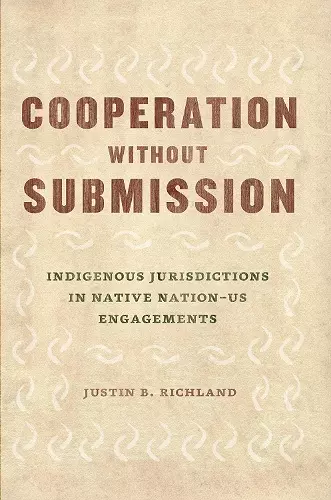Cooperation Without Submission
Indigenous Jurisdictions in Native Nation-Us Engagements
Format:Hardback
Publisher:The University of Chicago Press
Published:23rd Jul '21
Should be back in stock very soon

It is well-known that there is a complicated relationship between Native American tribes and the US government. Relations between tribes and the government are dominated by the principle known as the “Federal-Indian Trust Relationship.” The key aspect of this principle is that the government is supposed to engage in meaningful consultations with the tribes about issues that affect them. In Cooperation without Submission, Justin B. Richland, an associate justice of the Hopi Appellate Court and ethnographer, closely examines the language employed by both tribes and government agencies in over eighty hours of meetings between the two. Richland shows how tribes conduct these meetings using language that demonstrates their commitment to nation-to-nation interdependency, while federal agents appear to approach these consultations with the assumption that federal law is supreme and ultimately authoritative. Meaning, Native American tribes see themselves as nations with some degree of independence, entitled to recognition of their sovereignty over tribal lands, while the federal government acts to limit that authority. In this vital book, Richland sheds light on the ways the tribes use their language to engage in “cooperation without submission.”
"Justin B. Richland’s new book, Cooperation without Submission, provides a valuable decoder ring for non-Native government officials, scholars, and researchers who seek to consult meaningfully with Native leaders, Native nation governments, and their advocates. Rather than characterize and base recommendations on generalized Indigenous values or philosophies, the author draws conclusions from scrutinizing the details of specific Native–US engagements, and observing and analyzing the language used in meeting transcripts and legal texts. Richland does so with a thorough consideration of the current sociolegal scholarship on Indigenous law ways, settler colonialism, and US federal Indian law." * American Indian Culture and Research Journal *
"The true marvel of this book is its assertion of Indigenous sovereignty in the legal landscape, which Richland suggests is a key component in taking steps toward decolonization and as a way forward in Native Nation–US engagements predicated upon amore equitable relationship of reciprocity, respect, and understanding." * Great Plains Quarterly *
ISBN: 9780226608594
Dimensions: unknown
Weight: unknown
232 pages